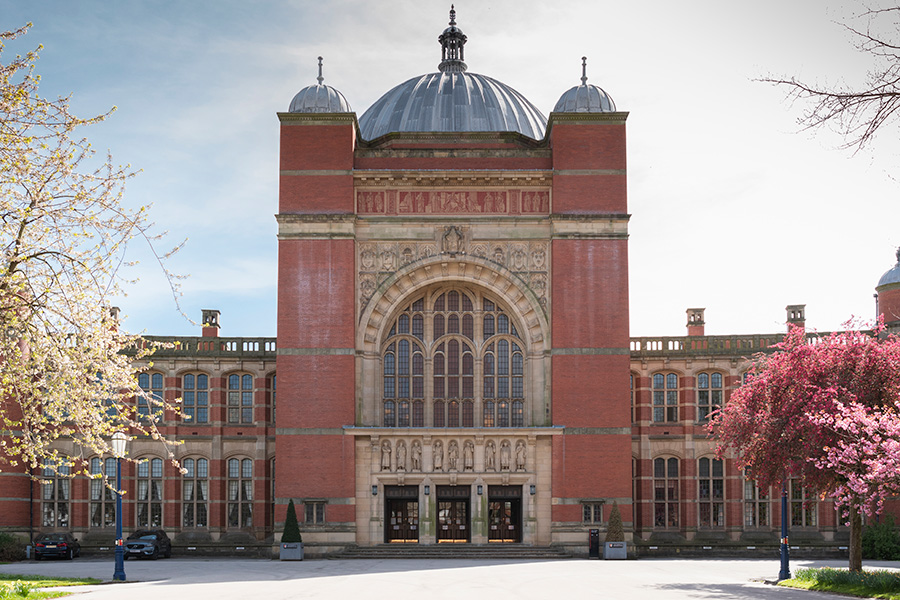Romance grammars, context and contact
- Dates
- Monday 8 January (00:00) - Wednesday 10 January 2024 (00:00)
We are delighted to announce the second edition of 'Romance grammars, context and contact', taking place at the University of Birmingham.
 As in the previous edition (2021), this conference will bring together scholars with expertise in Romance morphosyntactic variation, working at different interfaces (generative, sociolinguistics, dialectology, and language contact), alongside scholars and stakeholders working on language ideologies, language policy/planning and language documentation.
As in the previous edition (2021), this conference will bring together scholars with expertise in Romance morphosyntactic variation, working at different interfaces (generative, sociolinguistics, dialectology, and language contact), alongside scholars and stakeholders working on language ideologies, language policy/planning and language documentation.
Please note this is an in person event, not online.
This second edition of RGCC forms part of the project Heritage speakers of Spanish: the case of Latin American Londoners (PI: Norma Schifano; British Academy/Leverhulme Trust SRG21\211281). It will comprise general sessions as well as half a day dedicated to challenges and opportunities raised by working and collaborating with linguistic minorities and associated organizations and stakeholders.
The invited speakers for the general sessions are:
- Laura Domínguez (University of Southampton)
- Anna Pineda (Universitat de Barcelona)
The invited speakers for the special session on working with communities are:
- Jonathan Kasstan (University of Westminster)
- 'Tomás Restrepo Garcés of Latin American House, a London-based charity offering a variety of free services for the Latin American communities of the UK, partner of “Heritage speakers of Spanish: the case of Latin American Londoners”
Registration for the conference has now closed
Programme
Monday 8 January
12:50-13:00 Norma Schifano: Welcome and introduction
13:00-14:00 Keynote speaker - Laura Domínguez (University of Southampton): Spanish speakers in the UK/USA: investigating changes to their native grammars
14:00-14:30 James Corbet (University of Southampton): Explaining cross-linguistic influence in bilingual contact grammars: the case of perfective and imperfective marking by Spanish heritage speakers
14:30-15:00 Lewis Baker (Technische Universität Braunschweig): Morphosyntactic variation in a migration context: L1 attrition and L2 acquisition among L1 German – L2 Spanish bilinguals in Spain
15:00-15:30 Coffee break
15:30-16:00 Kim Groothuis (Universiteit Gent), Claudia Crocco (Universiteit Gent), Margherita Di Salvo (Università di Napoli Federico II), Sara Matrisciano-Mayerhofer (Wirtschaftsuniversität Wien): Pragmatic “quello” from dialect to regional standard
16:00-16:30 Giulia Cerullo (Universität Hamburg): The transitivization of unaccusatives in spoken Italian
16:30-17:00 Adam Ledgeway (University of Cambridge), Norma Schifano (University of Birmingham), Giuseppina Silvestri (UCLA): Language Contact in Magna Graecia: Convergence, Layering and Hybridism
17:00-17:30 Sara N. Cardullo (University of Cambridge), Ștefania Costea (University of Cambridge): Comparative contact: Loss of N-to-D movement in Daco-Romance & Italo-Romance
Tuesday 9 January
9:00-9:30 Roberto Merlo (Università di Torino): “Stars and Tulips”: The Nominal Morphology of Romanian between Latin Heritage and Balkan Influences
9:30-10:00 Ștefania Costea (University of Cambridge): When Latin meets Balkan: on head-directionality parameter in old Daco-Romance DPs
10:00-10:30 Zara Fahim: Theoretical and sociolinguistics at the interface: Revisiting language contact intensity and morphosyntactic change through Ibero-Daco Romance
10:30-11:00 Coffee break
11:00-11:30 Jonas Grünke (University Mainz), Jorge Vega Vilanova (University Hamburg), Susann Fischer (University Hamburg), Christoph Gabriel (University Mainz): Focus marking in language contact: the case of Bulgarian Judeo-Spanish
11:30-12:00 Norma Schifano (University of Birmingham): UK Ecuadorian Spanish: mood and V-movement under contact
12:00-12:30 Michelle Sheehan (Newcastle University), Ioanna Sitaridou (University of Cambridge): Object realisation in heritage Portuguese: a tale of stability and change!
12:30-13:00 Jorge Vega Vilanova (University of Hamburg), Susan Fischer (University of Hamburg): Morphosyntactic instability in Bulgarian Judeo-Spanish as a heritage language
13:00-15:00 Lunch break
Community session: collaborating with linguistic minorities and associated organizations
15:00-15:45 Norma Schifano (University of Birmingham): Introduction to the community session: the case of Latin American Londoners
15:45-16:30 Keynote speaker -Tomás Restrepo Garcés (Latin American House): Supporting Spanglish and Portuguese speaking communities in London
16:30-17:00 Coffee break
17:00-18:00 Keynote speaker - Jonathan Kasstan (University of Westminster): Practicing community-based research in contexts of critical language endangerment
19.30 Social dinner – Edgbaston Park Hotel(Bantock Room) (G23 on map)
Wednesday 10 January
9:30-10:30 Keynote speaker – Anna Pineda (Universitat de Barcelona): The role of language contact in the context of a minoritized language: the emergence and expansion of Differential Object Marking in Catalan
10:30-11:00 Laia Benavent-Llinares (University of Birmingham): Prescribing syntactic variation in Catalan
11:00-11:30 Marc Olivier (University of Oxford), Anna Paradis (University of Oxford): Exploring the morphosyntax of minoritised varieties: Restructuring in the Gallo-/Ibero-Romance continuum
11:30-12:00 Coffee break
12:00-12:30 Alessandro De Angelis (Università di Messina): Phonetics as last: innovation and preservation in the Gallo-Italic dialects of Sicily
12:30-13:00 Barbara Schirakowski (Freie Universität Berlin): Bilingual patterns of result lexicalization with manner verbs: Production data from two varieties of French in comparison to English
13:00-13:30 Stéphane Goyette (Acadia University): Laurentian French and its Breton substrate
Travel to the conference
Directions to Birmingham and to our Edgbaston campus are available on the Getting here page. The conference will be based in our University House (Business School), O2 in the orange zone on our campus map
Accommodation
We have our Edgbaston Park Hotel on campus. (Please note we do not have rooms reserved for the conference at the hotel, bookings are made by delegates on an individual basis.) Please also visit our accommodation page for advice on how to research other accommodation options.
Food and drink
For more information on food and drink options on and off campus visit our Food and Drink page.